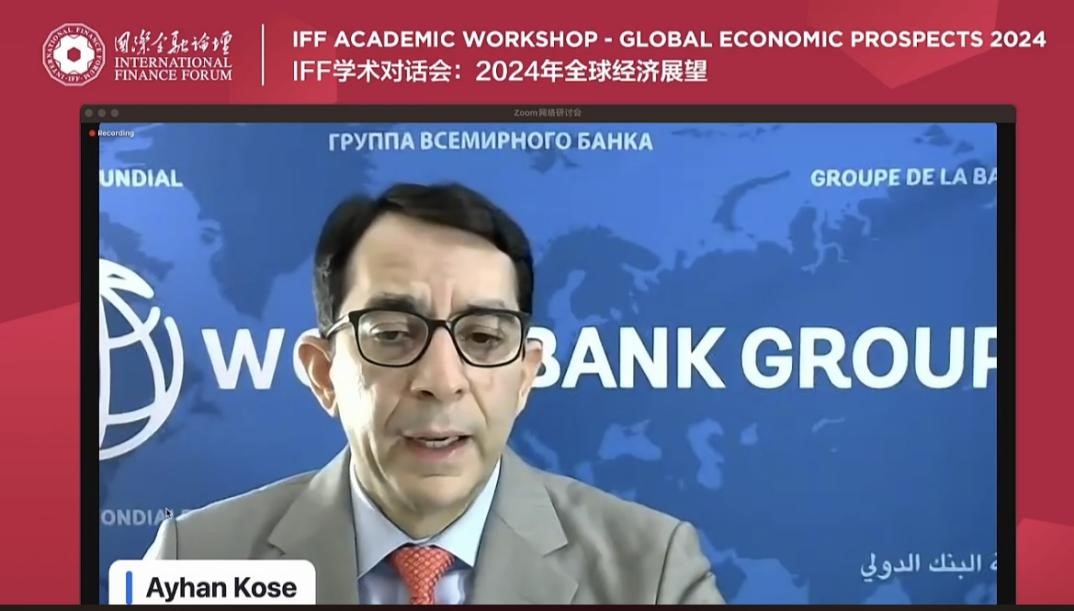World Bank: Emerging economies should increase investment in 2024, and China needs to change its growth model to promote growth through consumption.
China Daily, February 28th Ayhan Kose, deputy chief economist and director of the forecasting bureau of the World Bank, called on emerging economies to increase investment in 2024 to accelerate the global economic recovery at the academic dialogue on global economic outlook in 2024 hosted by the International Finance Forum (IFF) on February 28th.

In this dialogue, Gauss systematically introduced the World Bank’s outlook for global and regional economic growth in 2024. In particular, he pointed out the importance of accelerating investment in promoting economic growth in emerging and developing economies, and focused on global policy priorities. Gauss said that global economic growth still faces many challenges in 2024. Rapid and sustained investment will help to quickly resume production, improve labor productivity, promote global trade, promote foreign direct investment, reduce inflation and eliminate poverty, and improve the financial and financial situation of emerging markets and developing economies.
With regard to China’s economy in 2024, Gauss said that the challenge facing China is to transform its growth model, which should be transformed from investment and export-led economic growth model to consumption and service-led economic growth model as soon as possible. Gauss is very much in favor of the current policies adopted by China to promote the transformation of consumption and growth patterns. He said, "It is very important for China’s economy to enhance consumer confidence in the short term, promote the transformation of growth mode through firm reforms, and consolidate the expectation of medium and long-term economic growth."
According to the latest Global Economic Outlook report released by the World Bank, China’s economic growth is expected to slow down to 4.5% in 2024 due to low consumer confidence, slow consumption and persistent downturn in the real estate industry.
Gauss said that although the US economy will grow stronger than expected in 2023, driven by strong consumer demand, high interest rates will curb the momentum of US economic growth. The World Bank predicts that the US economic growth will slow down to 1.6% in 2024. Although the overall inflation rate in the United States is declining, the core inflation rate is still rising, so Gauss estimates that the Federal Reserve will cut interest rates in the second half of the year.
Gauss said that overall, the global economy will be the weakest since 1995 in the first half of 2024. Due to regional conflicts and geopolitical tensions, persistently high interest rates and financial stress risks, the growth of major economies will be lower than expected. The global economic growth in 2024 will also be affected by the downturn in trade activities. The World Bank predicts that the global economy will slow down to 2.4% in 2024.
According to Gauss analysis, the decline of manufacturing production and the interruption of supply chain in 2023 led to a flat global trade in 2023, but global trade is expected to pick up after experiencing ultra-low growth in 2023.
According to the latest Global Economic Outlook report released by the World Bank, various investments in many emerging economies are growing rapidly, but there is a tendency to slow down. He suggested that governments in emerging economies promote economic recovery by promoting investment more comprehensively and boldly. He said that reducing investment now will seriously hinder the realization of global climate-related goals and other sustainable development goals.
When talking about policy priorities, Gauss said that global cooperation should be strengthened to deal with climate change, ensure global food security, solve the debt problem and prevent trade decoupling. Policymakers in various countries should also improve fiscal and monetary policies to cope with the trade-off between debt and investment demand, narrow the gender gap and increase women’s participation in social economy.